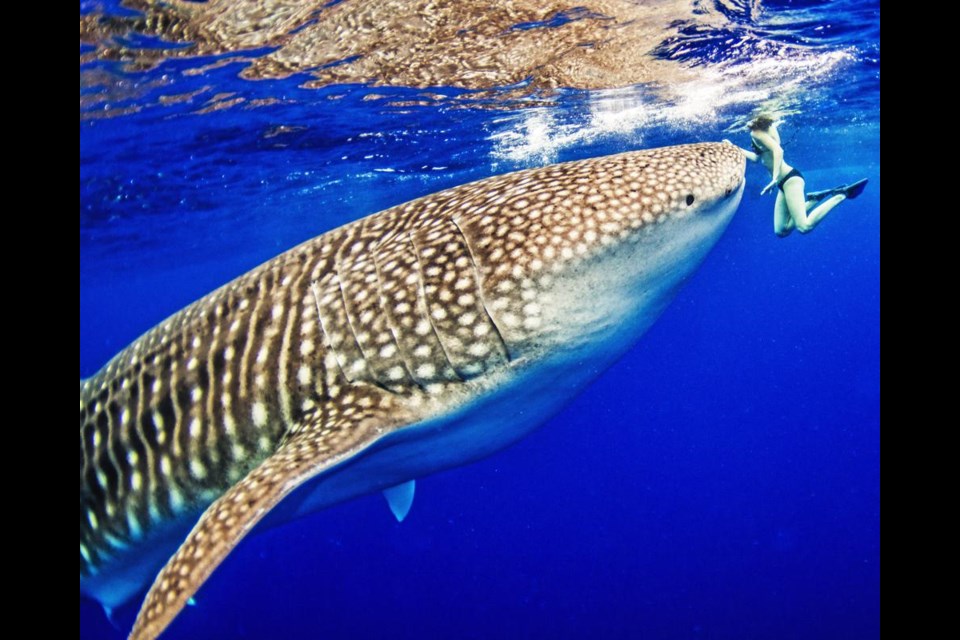WEYBURN – Weyburn student Zoe Molder will be taking an all-expense-paid two-year masters program in Europe in marine biology, starting this fall in Portugal.
This will be furthering her oceanic adventures that began years ago as she took scuba diving lessons with her family in Hawaii, while growing up on a grain farm north of Weyburn.
Her father Jeff developed an interest in underwater photography, and as Zoe explained, “I became fascinated by the underwater world and all the life below the surface and wanted to learn more about it.”
She graduated in August 2021 with her Bachelor of Science degree in marine biology from the University of Victoria, B.C., and began working as a research assistant in a fisheries ecology lab at the university.
“The PhD student I worked for told me about this Masters program, The International Master of Science in Marine Biological Resources, or IMBRSea for short. This MSc is an Erasmus Mundus program, which means they give out 15-20 Erasmus Mundus scholarships each year to non-EU applicants. These scholarships cover tuition fees, insurance, VISA-related costs, accommodation, travel, and provide a monthly allowance. I applied to this Masters program and I was accepted with an Erasmus Mundus scholarship,” explained Molder.
She will be taking a two-year program starting in September at the University of Algarve in Faro, Portugal, for her first semester.
The next two semesters will be taken at the Polytechnic University of Marche in Ancona, Italy, taking marine conservation, and marine habitat restoration.
“I will be writing my Master’s Thesis in semester 4 at a university of my choice that I pick at a later time,” she added. “I will be taking courses focusing on marine conservation and restoration for the first three semesters, and I will also do an internship after semester 2 to gain practical experience in the field.”
Asked what she is looking forward to with this new educational opportunity in her field, Molder replied, “I am looking forward to gaining further practical, hands-on, and international experience in coastal ecosystem restoration, conservation, and management practices while enhancing my research skills. Specifically, I want to learn more about restoration methods and techniques for seagrass meadows, algal forests, and tropical reefs.”
She also wants to develop her communication skills, as it is her dream to work in marine ecosystem restoration and conservation with public education, to teach about the role that marine ecosystems play in the health of the oceans, humankind and the planet.
Part of what motivated her to apply for this masters program was a class she took in her BSc program about the effects of climate change on the ocean, which she took in her last semester for her marine biology degree.
“After spending the last four years learning about all the fascinating marine ecosystems and organisms, this class hit hard because it discussed the threats and disturbances our oceans face and how detrimental these threats will be to not only the health of the ocean but also to humans,” said Molder.
One of her favourite experiences was working the summer of 2019 at a non-governmental organization (NGO) called the Archipelagos Institute of Marine Conservation in Samos, Greece.
“I took part in many marine conservation-related projects such as monitoring dolphin populations around the Aegean Sea, conducted beach cleans, led the fish identification project, educated local communities, and was a member of the marine mammal stranding and response team,” she said, noting this gave her the travel bug as she was able to make some international connections.
In the summers of 2020 and 2021, she worked on Vancouver Island for an NGO called Cetus Research and Conservation Society. “From a small inflatable vessel, I monitored and collected data on cetacean behaviour (mainly for humpback whales and orcas), environmental conditions, and vessel traffic interactions,” she said.
“I have also enjoyed the hands-on field work that I have experienced in my studies. For example, I went to the Bamfield Marine Sciences Centre on multiple field trips to study intertidal ecosystems on the remote west coast of Vancouver Island. I also went on biological oceanography cruises to collect plankton samples,” she added, noting she did her Honours thesis on humpback whale calls in British Columbia and their association with diving behaviour.
For her next adventure, she said, “I look forward to being in an internationally and culturally diverse program. I’m excited to travel and learn about new cultures while establishing a multinational network in the field of marine conservation and restoration.”





